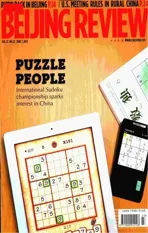A Game for an Intelligent World
2012-12-23
A Game for an Intelligent World
Sudoku is a puzzle game originally played with pen and paper. Today,with the invention of hi-tech gadgets like tablet computers and smart phones, the game is available in digital form and getting popular in China.
The 2012 Beijing International Sudoku Tournament concluded in late May. More than 50 competitors gathered from 14 countries and regions including the United States, Germany, the Czech Republic,Japan, and China. Qiu Yanzhe, 13, a competitor from China, won second place in the under 18 division. Qiu’s knowledge of the game began in the fourth grade of primary school, when he came across a Sudoku puzzle in a textbook. He believes the game greatly improves his ability in logic and learning.
As an intelligence-strengthening activity that combines competition and leisure, Sudoku is similar to conventional word puzzles, but instead uses the numbers 1 through 9. It has been called the “magic box in the era of globalization.” Recently, it has developed into a versatile game that helps to develop children’s intelligence, relieve people from daily work pressure and prevent senile dementia in the elderly.There are now nearly 100 versions of the puzzle available on computers and phones.
Sudoku formally entered the Chinese mainland in 2007, but the Chinese are not unfamiliar with the game’s format. As early as several thousand years ago, the Chinese already developed the game ofJiugong(a similar number-based puzzle played on a 3×3 grid). The ancient game is very helpful in developing logical problem-solving skills. For millennia, theJiugongpuzzle appeared often in Chinese legends and novels. The two mysterious diagrams handed down from ancient times,HetuandLuoshu, are regarded as early milestones in China’s civilization. InLuoshu, the sum of the three numbers on each column, each row and the oblique line is always 15. During the Tang and Song dynasties (the seventh to 13th centuries), the Jiugong puzzle was very popular.
Since March 2011, a program called Happy Sudoku has become popular in China’s primary schools. More than 300,000 schoolchildren have joined in the activity in more than 30 cities. Meanwhile,many schools are training teachers to introduce Sudoku into school curriculum.
Beijing will soon establish a Sudoku association to attract new legions of players. In the meantime, the puzzle’s popularity continues to grow among the masses in China.
